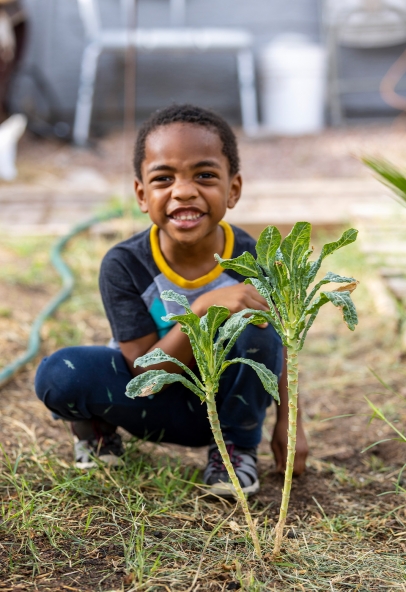Feeding A Community
On a Saturday morning in August, Kadija Farah walked around Ibado Mahmud’s backyard garden and surveyed the effects of the recent heatwave. The banana tree and mint bush had fared poorly, but the sweet potato vines and fig trees were surprisingly healthy. She plucked a few dark leaves from one of the raised garden beds, which were protected by large shade nets.
“This is spinach, but a different kind,” Farah explained before taking a bite. It was Egyptian spinach, known as molokhia in Arabic. She included the Arabic or Somali names as she gestured to other fruits and vegetables — there were seytuun (guava) and also bamya (okra).
Farah scrolled through her phone to find photos of the garden from earlier in the year. She smiled at pictures of eggplants, zucchini and red Swiss chard. In one photo, an entire wheelbarrow was filled with spinach and other edible greens.
Yonas Kahsai, Mahmud’s son, carried a tray of Somali tea made from a blend of cardamom, clove, and ginger, which he sweetened with natural sugar. Later that morning, he’d help serve a breakfast of vegetable stew with kale, yellow squash, and other garden items. Farah was busy carefully portioning vegetables into brown paper sacks. After they ate, a volunteer would come load the bags into a car for delivery.
Family, friends, and volunteers gather most Saturdays in Mahmud’s backyard to bag and distribute the produce, but had skipped the past few weekends on account of record-breaking heat. This morning, however, a gray, cloudy sky brought cooler temperatures and a welcome chance of rain. In only a few short weeks, the garden would be thriving again.
Farah and Mahmud are two of the founders of Drinking Gourd Farms in Phoenix, a network of backyard gardeners and homesteaders growing and distributing food to people in their communities. Both women know from experience the importance of helping others.
“I always be that person that connected people that immigrated,” Mahmud said. “I’m always a community person. That connection for all the community people.”
The Beginning
Mahmud is originally from Somalia, a majority Muslim country in East Africa. In 1990, during the Somali Civil War, she and her husband relocated to a refugee camp in Kenya with their three children. In 1993, they moved to Phoenix as part of an asylum resettlement program.
Neither she nor her husband spoke English when they arrived. Navigating a brand-new way of life was a challenge, Mahmud said, and many of the obstacles they faced were overcome through trial and error. Everyday tasks, such as cooking or washing clothes, were difficult.
Mahmud recounts a story from this time of seeing a woman in their apartment complex carrying a bag of clothes. She thought to herself that the woman must be taking them to wash somewhere, and since Mahmud had not yet figured out how to use the machines, she followed with her husband and three children. From a distance, the woman saw the family watching and, despite the language barrier, offered to show them. Realizing they had no quarters or soap for the machines, she went to the other neighbors and gathered supplies for the family. Mahmud refers to the woman as “an angel” who helped them get started in those early days.
They were able to build a new life with the support of others. The experience left a deep impression on Mahmud and showed her the importance of looking out for others. With the help of that neighbor, she contacted her sponsor organization and instructed them to connect her with any new people arriving in Phoenix from Africa.
“I don’t want anybody to suffer,” Mahmud said, “so let us know when our people coming. Then we find the whole community and how they can get a shuttle, get a job, how to drive, how to ride the bus. It was a very painful experience for me and I don’t want anybody to be through what I been through.”
Helping people is Mahmud’s passion, according to her daughter and Drinking Gourd Farms organizer Nemo Kahsai. “As some of the first Somalis that helped build a community with other Somalis here in Arizona, it’s just something that she’s always had a drive for,” Kahsai said. “My whole life growing up, I can remember always having someone in our house: aunties, uncles, and cousins.”
Eventually, Mahmud and her family noticed a pattern. When they visited Somalia or Ethiopia, which could be for months at a time, they arrived back in the U.S. feeling stronger and healthier. They attributed the change to differences between the quality of food in the U.S. compared to in their home countries.
“It was like they had a pep in their step and were just so much more spritely, energized and healthier because when they went home, they ate clean, organic food,” Kahsai said. “When you come [to the U.S.], the food’s not the same unless you go out of your way to try and purchase organic, and organic is so much more expensive…”
One day, Mahmud’s son, who is also a community organizer, was expressing his frustration that the Black community, whether East African immigrants or U.S.-born African Americans, often do not have access to quality, affordable food like organics. Mahmud said she wished they had land to farm so they could provide food for people and feed themselves.
“And [my son] go, we can do it in the backyard,” she said.
Providing for the Community
In October 2019, Mahmud, her children, and other community organizers started Drinking Gourd Farms, led by black Muslim refugee women like herself and Farah. At first, she could not get anything to grow. They didn’t have the right soil or tools and gardening in a Phoenix backyard was very different from Somalia where the ground is more naturally fertile. She quickly learned when certain vegetables were in season and how to amend her backyard with compost to improve soil fertility. According to Mahmud, the community had 28 backyard gardens within their first year.
In addition to gardening, they also purchase food from local growers like Golo Farms, a commercial farm run by Liberian refugees. Black Phoenix Organizing Collective helped provide funds for purchasing the food, although Drinking Gourd Farms is now a registered LLC and seeks private funding through grants or donations.
Their network of volunteers and families in need was created through word of mouth within their communities. “We’ve had people reach out to us on Instagram to say, ‘Hey, if you’re still doing food distributions, I would love to be put on the list. We’re struggling with food.’ We’ll put them on the list,” Kahsai said.
In 2020, the Covid-19 pandemic greatly increased need just as Drinking Gourd Farms was getting started. Black and lower income families experience disproportionate rates of food insecurity, which the pandemic exacerbated.
“I think at the height of Covid we were getting 200 families a week,” Kahsai said. “Covid was such a scary thing that it really rallied the community to want to help everyone. That’s kind of where we kicked off greatly, was during the pandemic.”
While the pandemic-related assistance they received is no longer available, they still deliver food to families and purchase from farmers markets whenever possible. Mahmud aspires to one day expand Drinking Gourd Farms by having enough land to raise chickens, goats and other animals, along with produce. They’d also like to continue providing opportunities for young people or those who are leaving incarceration. According to Kahsai, gardening develops skills for self-sufficiency and connects people with those around them through positive experiences.
“Food really impacts how you feel and how you think and how you process. [My mom] just wanted to figure out a way to teach people that it’s easy to do it as long as you know how to do it,” Kahsai said.
She adds that for many people, responsibilities like work or caring for children leave little time or energy for maintaining a garden, particularly for immigrants who often provide for family in their home countries as well. Drinking Gourd Farms wants to make sure they still have access to nutritious food.
“What my father teach me,” Mahmud said, “when we are a human being, we have always be respectful for another human being. And we always have to be responsible [for] who we are, not forget who we are. And that’s what I teach my kids.”





